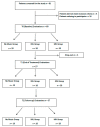Conventional and Algorithmic Music Listening before Radiotherapy Treatment: A Randomized Controlled Pilot Study
- PMID: 34942921
- PMCID: PMC8699134
- DOI: 10.3390/brainsci11121618
Conventional and Algorithmic Music Listening before Radiotherapy Treatment: A Randomized Controlled Pilot Study
Abstract
Music listening is a widespread approach in the field of music therapy. In this study, the effects of music listening on anxiety and stress in patients undergoing radiotherapy are investigated. Sixty patients with breast cancer who were candidates for postoperative curative radiotherapy were recruited and randomly assigned to three groups: Melomics-Health (MH) group (music listening algorithmically created, n = 20); individualized music listening (IML) group (playlist of preferred music, n = 20); no music group (n = 20). Music listening was administered for 15 min immediately before simulation and during the first five radiotherapy sessions. The State-Trait Anxiety Inventory (STAI) and the Psychological Distress Inventory (PDI) were administered before/after treatment. Cochran's Q test and McNemar test for paired proportions were performed to evaluate if the proportion of subjects having an outcome score below the critical value by treatment and over time was different, and if there was a change in that proportion. The MH group improved in STAI and PDI. The IML group worsened in STAI at T1 and improved STAI-Trait at T2. The IML group worsened in PDI at T2. The No music group generally improved in STAI and PDI. Clinical and music listening-related implications are discussed defining possible research perspectives in this field.
Keywords: algorithmic music; anxiety; breast cancer; music listening; music therapy; radiotherapy; stress.
Conflict of interest statement
The authors declare no conflict of interest. The funders had no role in the design of the study; in the collection, analyses, or interpretation of data; in the writing of the manuscript, or in the decision to publish the results.
Figures


References
-
- Mössler K., Chen X., Heldal T.O. Music therapy for people with schizophrenia and schizophrenia-like disorders. Cochrane Database Syst. Rev. 2011;12:CD004025. - PubMed
LinkOut - more resources
Full Text Sources
Medical

